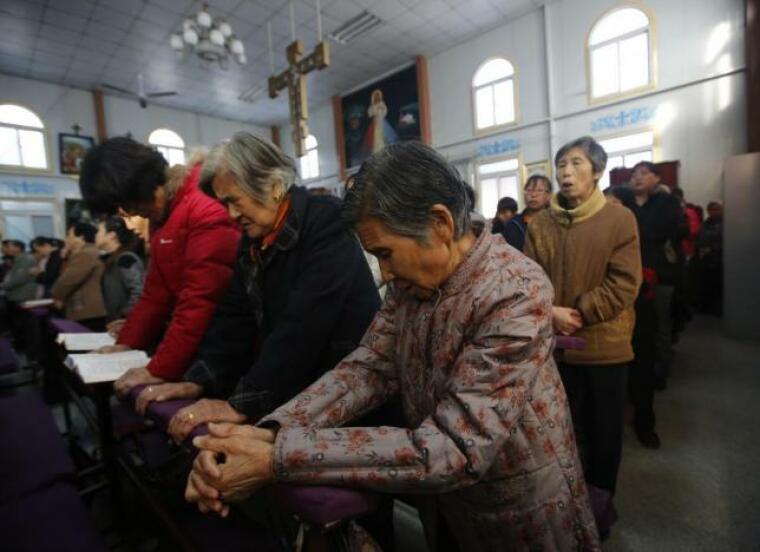China steps up crackdown on underground churches in Henan province

Christians in China's central Henan province have complained that members of underground churches have been targeted by local officials with threats and fines since early February.
According to China Aid, a new initiative in Nanyang, Henan requires all Christians in the area to join an officially registered church. All religious gatherings in people's homes are explicitly prohibited, and anyone caught attending or hosting meetings outside of a registered religious venue will be ordered to pay a fine of 30,000 yuan (US$4,700).
Some members of underground churches have been reluctant to join the official Chinese Protestant Church, known as the Three-Self Patriotic Movement, as most of these churches are required to teach loyalty to the Communist Party and Chinese State and often teach propaganda over the actual tenets of these faiths.
"Some of the house church members did not register with the Three-Self Churches, and government officials showed up and inspected their houses. Some brothers and sisters have been too scared to gather. Some split into smaller groups and continue to meet," a local Christian who was identified only as Ms. Wang told a reporter on Feb. 28.
The new restrictions on churches came after the Chinese government implemented new regulations for religious affairs on Feb. 1. In several regions, minors have been prohibited from entering places of worship after the implementation of the new policy.
Officially registered churches within the Three-Self Patriotic Movement have also been targeted by the government despite their officially recognized status.
In Jiangxi province, local officials ordered the removal of a cross on top of Shaxi Church. When church members refused, the officials dispatched a team with a heavy-duty crane to forcibly demolish the cross on Feb. 22.
About 20 female church members tried to stop the demolition by linking arms and singing hymns to block the path of the machinery, but a 10-person team of officials pushed past them and tore down the cross.
After negotiating with church members, the local religious affairs bureau had agreed to allow the church to build a smaller cross and place it on the wall, instead of on top of the building.
"The government agreed to my demand of making a smaller cross, but we can only place it on the church wall. We are not allowed to place a large cross on top of the building. Currently, the cross inside the church is still intact," said a church member who was only identified as Zhang.
Officials often remove the crosses by saying the display violates building codes or by using other excuses. In Zhejiang province, around 2,000 crosses were destroyed in a period of three years after the provincial government launched its "beautification campaign" in an effort to remove all crosses throughout the area.
 Christians don't have to affirm transgenderism, but they can’t express that view at work: tribunal
Christians don't have to affirm transgenderism, but they can’t express that view at work: tribunal Archaeology discovery: Medieval Christian prayer beads found on Holy Island
Archaeology discovery: Medieval Christian prayer beads found on Holy Island Presbyterian Church in America votes to leave National Association of Evangelicals
Presbyterian Church in America votes to leave National Association of Evangelicals Over 50 killed in 'vile and satanic' attack at Nigerian church on Pentecost Sunday
Over 50 killed in 'vile and satanic' attack at Nigerian church on Pentecost Sunday Ukrainian Orthodox Church severs ties with Moscow over Patriarch Kirill's support for Putin's war
Ukrainian Orthodox Church severs ties with Moscow over Patriarch Kirill's support for Putin's war Islamic State kills 20 Nigerian Christians as revenge for US airstrike
Islamic State kills 20 Nigerian Christians as revenge for US airstrike Man who served 33 years in prison for murder leads inmates to Christ
Man who served 33 years in prison for murder leads inmates to Christ


 Nigerian student beaten to death, body burned over ‘blasphemous’ WhatsApp message
Nigerian student beaten to death, body burned over ‘blasphemous’ WhatsApp message 'A new low': World reacts after Hong Kong arrests 90-year-old Cardinal Joseph Zen
'A new low': World reacts after Hong Kong arrests 90-year-old Cardinal Joseph Zen Iran sentences Christian man to 10 years in prison for hosting house church worship gathering
Iran sentences Christian man to 10 years in prison for hosting house church worship gathering French Guyana: Pastor shot dead, church set on fire after meeting delegation of Evangelicals
French Guyana: Pastor shot dead, church set on fire after meeting delegation of Evangelicals ‘Talking Jesus’ report finds only 6% of UK adults identify as practicing Christians
‘Talking Jesus’ report finds only 6% of UK adults identify as practicing Christians Mission Eurasia ministry center blown up in Ukraine, hundreds of Bibles destroyed: 'God will provide'
Mission Eurasia ministry center blown up in Ukraine, hundreds of Bibles destroyed: 'God will provide' Church holds service for first time after ISIS desecrated it 8 years ago
Church holds service for first time after ISIS desecrated it 8 years ago Burger King apologizes for 'offensive campaign' using Jesus' words at the Last Supper
Burger King apologizes for 'offensive campaign' using Jesus' words at the Last Supper Uganda: Muslims abduct teacher, burn him inside mosque for praying in Christ’s name
Uganda: Muslims abduct teacher, burn him inside mosque for praying in Christ’s name